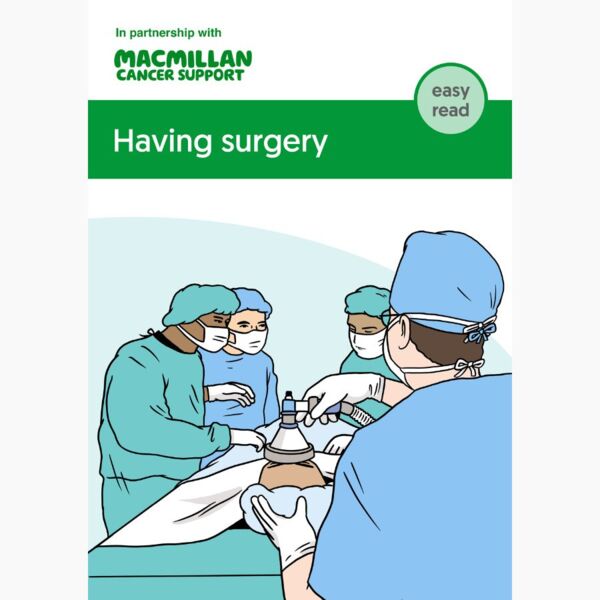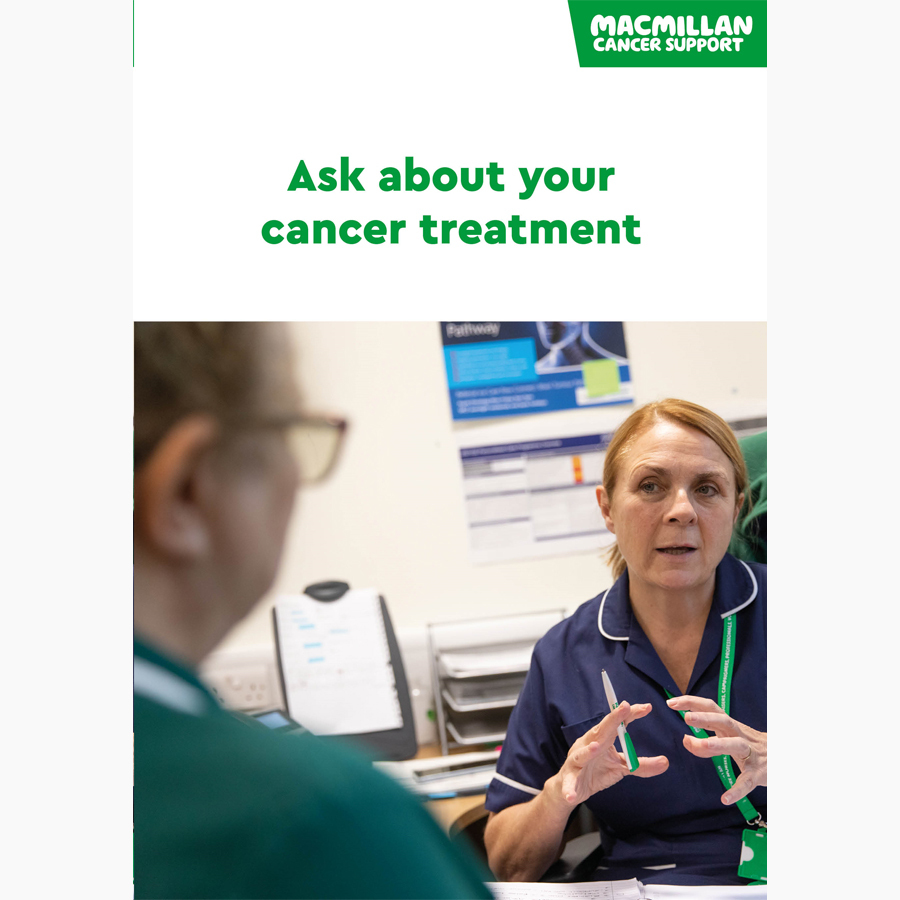Surgery
Surgery is when a surgeon removes all or part of the cancer. It can be used to treat many types of cancer.
What is surgery?
Surgery is a medical procedure to examine, remove or repair tissue. For example, it can be used to diagnose or remove cancer. We have more information on when you might have surgery for cancer.
The type of surgery you have, and how long you stay in hospital for, depends on your situation. Your healthcare team will talk to you about this. They will explain:
- how you can prepare for the surgery
- possible side effects and complications of the surgery
- going into hospital for surgery
- what happens after surgery
- how you recover from the surgery
- other healthcare professionals you may meet.
They will give you written information explaining this before you agree (consent) to have treatment. Your healthcare team can also talk to you about other possible treatment options.
Related pages
Booklets and resources
Surgery and other treatments for cancer
You may have other cancer treatments with surgery. This could be:
- before surgery, to shrink the cancer and make surgery possible, or reduce the amount of surgery needed – this is called neoadjuvant treatment
- after surgery, to get rid of any remaining cancer cells
- after surgery, to reduce the risk of cancer coming back – this is called adjuvant treatment.
Treatments include:
Related pages
Booklets and resources
Types of surgery
There are different ways of doing cancer surgery. The main types include the following.
-
Open surgery
Open surgery is when the surgeon makes 1 large cut. This means the surgeon can directly see the cancer or parts of the body that need to be removed.
Sometimes they need to make more than 1 cut. For example, in surgery for breast cancer, they may make another cut in the armpit area (axilla) so they can remove some or all of the lymph nodes.
-
Keyhole surgery (laparoscopic)
Keyhole surgery (laparoscopic) can be used to operate in the upper and lower tummy areas. These are called the abdomen and pelvis.
In keyhole surgery, the surgeon makes several small cuts instead of 1 larger cut. This leaves much smaller wounds, so you usually recover faster.
The surgeon puts a thin tube with a light and camera on the end through one of the cuts. This is called a laparoscope. The camera shows an image of inside your body on a screen. Air (carbon dioxide gas) is pumped into your abdomen or pelvis to help get a better view and separate parts of the body.
Through the other cuts, the surgeon uses other instruments to perform the surgery. Sometimes you might need to have a slightly larger cut if the surgeon needs to remove an organ or a cancer.
-
Robotic surgery
Robotic surgery is when keyhole surgery is helped by a machine. Instead of the surgeon holding the laparoscope and the surgical equipment, these are attached to robotic arms. The surgeon controls the robotic arms from a console. The arms can be moved very precisely.
There will also be someone beside you during the surgery. They are there to assist the surgeon.
This is specialised surgery and only available in some hospitals in the UK. You may need to travel to a different hospital to have robotic surgery.
-
Endoscopic surgery
Sometimes tissue can be removed without making any cuts through the skin.
The surgeon uses a thin, flexible tube with a light and camera on the end to examine areas inside the body. This tube is called an endoscope. The surgeon passes the endoscope
through an opening in the body. For example, this can be through the mouth to look at the stomach (gastroscopy) or lungs (bronchoscopy). Or it could be inserted into the bowel (colonoscopy) or bladder (cystoscopy).
Instruments can be passed through the endoscope to remove a sample of tissue. This is called a biopsy. Sometimes pre-cancerous cells or small cancers may be removed.
Sometimes an endoscope is used to give treatments that destroy pre-cancerous cells or cancer cells. These include:
- light beams – this is called laser therapy
- electricity – this is called electrosurgery
- freezing – this is called cryosurgery
- heat – this is called radiofrequency ablation.
You may find it helpful to read more about the type of cancer you have. This includes information on the tests, or types of surgery you may have.
Preparing for surgery
Your multidisciplinary team (MDT) will plan your surgery carefully. They will explain the surgery, the possible side effects and what to expect.
Your MDT may suggest things you can do to improve your general health before and after surgery. This is sometimes called prehabilitation.
They may also talk about things you can do to reduce the time you spend in hospital and help you to recover as quickly as possible. This is called enhanced recovery.
You will have a pre-operative assessment appointment before the surgery. This is usually with a nurse. They will do some tests and checks before your surgery. They will also help you prepare for surgery and answer your questions.
We have more information about preparing for surgery, prehabilitation and enhanced recovery.
What happens after surgery?
What happens after surgery depends on the type of surgery you have. Your surgeon or specialist nurse will talk to you about what to expect.
When you wake up after surgery
Some surgery requires you to have a general anaesthetic so that you are asleep. Other surgery may be done while you are awake, but anaesthetic is used so you cannot feel anything. We have more information about having an anaesthetic.
You are usually moved to the recovery room in the operating department to be monitored until you are awake. You are then moved back to the ward a short time later. Depending on the type of surgery you had, or if you have other health conditions, you may wake up in intensive care or a high-dependency recovery unit. You usually move back to the ward within 1 day or so.
How you feel when you wake up depends on what kind of anaesthetic and surgery you had. You may have:
- side effects, such as pain, or feeling sick – tell your nurse if this happens and they can give you something to help
- a drip of fluids into a vein in your arm – this is called an intravenous infusion
- a tube (surgical drain) put into your wound to help remove any extra fluid – your doctor or nurse will tell you about this before the surgery.
How long you are in hospital depends on what type of surgery you had. You are usually encouraged to get up and move around as soon as you feel able to. This can help with recovery.
Wound care
Your nurse will look after your wound while you are in hospital. They will explain how to look after it at home. Some people may need their dressings changed, or stitches or clips removed, by a community nurse or their practice nurse.
Complications of surgery
The nurses will explain any complications from surgery to look out for. If you feel unwell or have any problems while you are at home, contact the hospital anytime day or night on the number they give you.
Follow-up after your operation
You usually meet with your surgeon or specialist nurse a few weeks after your surgery. They will check the wound and make sure everything is healing properly. They will also give you advice about how soon you can get back to work, travel or drive again.
Your surgeon or specialist nurse will explain how often you will have follow-up appointments.
We have more information about what happens after surgery and recovering after surgery.
Get this information in another language or format
We are committed to making our website as accessible as possible, to make sure that everyone can use it.
We have information about surgery in over 16 languages, and in other formats including British Sign Language videos and easy read booklets.
If we don't have what you are looking for, you can ask for information to be translated for free or provided in a format to suit you. Email us at informationproductionteam@macmillan.org.uk or call us on 0808 808 00 00.
About our information
This information has been written, revised and edited by Macmillan Cancer Support’s Cancer Information Development team. It has been reviewed by expert medical and health professionals and people living with cancer.
-
References
Below is a sample of the sources used in our general surgery information. If you would like more information about the sources we use, please contact us at informationproductionteam@macmillan.org.uk
Perioperative care in adults. NICE guideline [NG180]Published: 19 August 2020 https://www.nice.org.uk/guidance/ng180/chapter/Recommendations
Venous thromboembolic diseases: diagnosis, management and thrombophilia testing. NICE guideline [NG158]Published: 26 March 2020 Last updated: 02 August 2023 https://www.nice.org.uk/guidance/ng158
Powell, R., Davies, A., Rowlinson-Groves, K. et al. (2023) Acceptability of prehabilitation for cancer surgery: a multi-perspective qualitative investigation of patient and ‘clinician’ experiences. BMC Cancer 23, 744. https://doi.org/10.1186/s12885-023-10986-0
Date reviewed

Our cancer information meets the PIF TICK quality mark.
This means it is easy to use, up-to-date and based on the latest evidence. Learn more about how we produce our information.
The language we use
We want everyone affected by cancer to feel our information is written for them.
We want our information to be as clear as possible. To do this, we try to:
- use plain English
- explain medical words
- use short sentences
- use illustrations to explain text
- structure the information clearly
- make sure important points are clear.
We use gender-inclusive language and talk to our readers as ‘you’ so that everyone feels included. Where clinically necessary we use the terms ‘men’ and ‘women’ or ‘male’ and ‘female’. For example, we do so when talking about parts of the body or mentioning statistics or research about who is affected.
You can read more about how we produce our information here.






